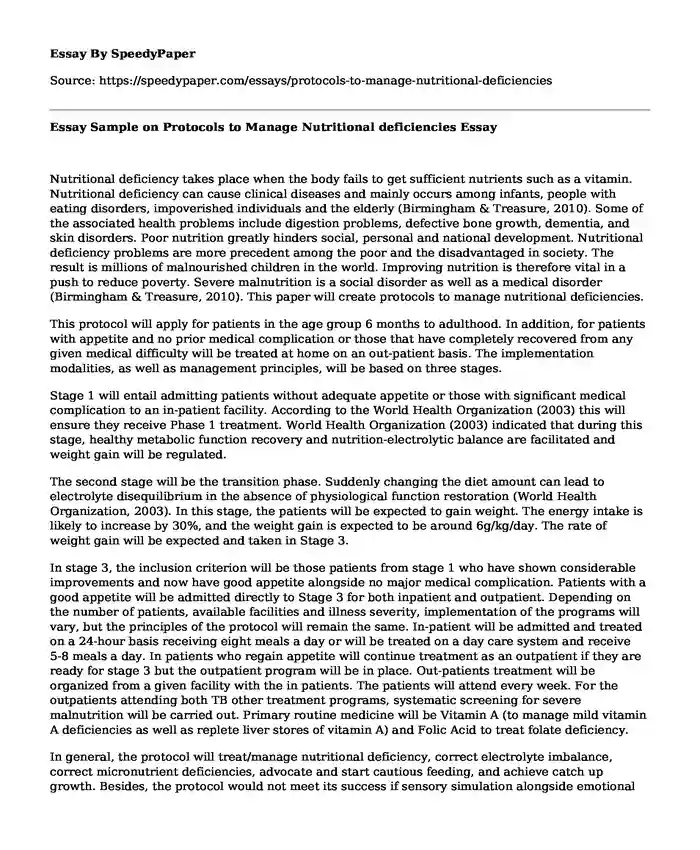Nutritional deficiency takes place when the body fails to get sufficient nutrients such as a vitamin. Nutritional deficiency can cause clinical diseases and mainly occurs among infants, people with eating disorders, impoverished individuals and the elderly (Birmingham & Treasure, 2010). Some of the associated health problems include digestion problems, defective bone growth, dementia, and skin disorders. Poor nutrition greatly hinders social, personal and national development. Nutritional deficiency problems are more precedent among the poor and the disadvantaged in society. The result is millions of malnourished children in the world. Improving nutrition is therefore vital in a push to reduce poverty. Severe malnutrition is a social disorder as well as a medical disorder (Birmingham & Treasure, 2010). This paper will create protocols to manage nutritional deficiencies.
This protocol will apply for patients in the age group 6 months to adulthood. In addition, for patients with appetite and no prior medical complication or those that have completely recovered from any given medical difficulty will be treated at home on an out-patient basis. The implementation modalities, as well as management principles, will be based on three stages.
Stage 1 will entail admitting patients without adequate appetite or those with significant medical complication to an in-patient facility. According to the World Health Organization (2003) this will ensure they receive Phase 1 treatment. World Health Organization (2003) indicated that during this stage, healthy metabolic function recovery and nutrition-electrolytic balance are facilitated and weight gain will be regulated.
The second stage will be the transition phase. Suddenly changing the diet amount can lead to electrolyte disequilibrium in the absence of physiological function restoration (World Health Organization, 2003). In this stage, the patients will be expected to gain weight. The energy intake is likely to increase by 30%, and the weight gain is expected to be around 6g/kg/day. The rate of weight gain will be expected and taken in Stage 3.
In stage 3, the inclusion criterion will be those patients from stage 1 who have shown considerable improvements and now have good appetite alongside no major medical complication. Patients with a good appetite will be admitted directly to Stage 3 for both inpatient and outpatient. Depending on the number of patients, available facilities and illness severity, implementation of the programs will vary, but the principles of the protocol will remain the same. In-patient will be admitted and treated on a 24-hour basis receiving eight meals a day or will be treated on a day care system and receive 5-8 meals a day. In patients who regain appetite will continue treatment as an outpatient if they are ready for stage 3 but the outpatient program will be in place. Out-patients treatment will be organized from a given facility with the in patients. The patients will attend every week. For the outpatients attending both TB other treatment programs, systematic screening for severe malnutrition will be carried out. Primary routine medicine will be Vitamin A (to manage mild vitamin A deficiencies as well as replete liver stores of vitamin A) and Folic Acid to treat folate deficiency.
In general, the protocol will treat/manage nutritional deficiency, correct electrolyte imbalance, correct micronutrient deficiencies, advocate and start cautious feeding, and achieve catch up growth. Besides, the protocol would not meet its success if sensory simulation alongside emotional support is not provided. The last phase of the protocol will be the preparation of a follow up after patient recovery.
References
Birmingham, C. L., & Treasure, J. (2010). Medical management of eating disorders. Cambridge University Press.World Health Organization. (2003). Guidelines for the inpatient treatment of severely malnourished children (No. Technical Publication No. 24). WHO Regional Office for South-East Asia.
Cite this page
Essay Sample on Protocols to Manage Nutritional deficiencies. (2022, Nov 30). Retrieved from https://speedypaper.net/essays/protocols-to-manage-nutritional-deficiencies
Request Removal
If you are the original author of this essay and no longer wish to have it published on the SpeedyPaper website, please click below to request its removal:
- Cultural Geography Essay Sample
- Essay Example on Designing the Perfect Personal Identity
- Art Essay Example: Formal Analysis of Marilyn (Vanitas)
- Essay Sample Describing the Organizational Structure of the Teamsters
- Essay Sample on Interviewing a Senior Accountant
- Free Essay: Impacts of The BP Gulf Spill
- Free Essay Example - Handheld Computer
Popular categories





